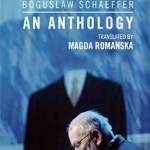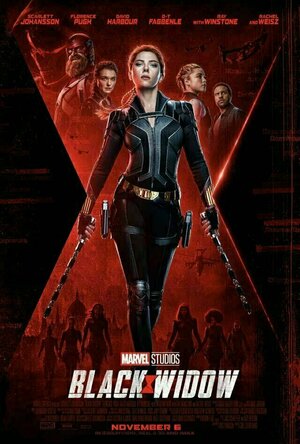Search

Boguslaw Schaeffer: An Anthology
Boguslaw Schaeffer and Magda Romanska
Book
"This anthology of plays by Boguslaw Schaeffer, a Polish playwright, composer, musicologist and...
Chris Sawin (602 KP) rated Black Widow (2021) in Movies
Oct 6, 2021
Florence Pugh (2 more)
The free-fall sequence at the end.
Taskmaster before the mask comes off.
It's way too long. (3 more)
The Taskmaster changes are weak.
It's as if the characters are fighting over who gets to be the comedic relief.
Familiar storyline.
Espionage Exhaustion
Black Widow is a film explaining what Natasha Romanoff (Scarlett Johansson) was up to in-between Captain America: Civil War and Avengers: Infinity War. The film was originally set to be released in May of 2020, but was pushed back and had three different release dates thanks to COVID-19. Unfortunately, most completed films that sit on the shelf and are in limbo for over a year rarely live up to the anticipation. Black Widow is worthwhile for a few key action sequences and notable characters that steal the spotlight, but is otherwise a mostly forgettable superhero film.
Marketed as a superhero film, Black Widow is also a spy thriller. Johansson has stated that films such as Logan, Harrison Ford’s The Fugitive, and Terminator 2: Judgment Day were influences. After Civil War, Thaddeus Ross (William Hurt) is on the hunt for Natasha Romanoff. Women like Natasha who have had similar training in a torturous training facility known as The Red Room are victims to brainwashing by a man named Dreykov (Ray Winstone), but a serum ends up in Natasha’s hands that can break Dreykov’s brainwashing. Natasha begins searching for The Red Room and Dreykov, which also has her crossing paths with other spies that posed as her family members; her “sister” Yelena Belova (Florence Pugh), her “father” Alexai Shostakov (David Harbour), and her “mother” Melina Vostokoff (Rachel Weisz).
The biggest selling point for Black Widow is that it’s a mostly female cast in front of and behind the camera. The film is directed by Cate Shortland and Black Widow is her first big budget feature. It’s also co-written by female screenwriter Jac Schaeffer (uncredited co-screenwriter of Captain Marvel) and Ned Benson (director of The Disappearance of Eleanor Rigby).
Taskmaster is cool in the film until you realize the character has been altered from his comic book origins. This isn’t uncommon in the MCU or even other live-action superhero adaptations, but what the character has become in the film will be received with mixed results. In the comics, Taskmaster’s real identity is Anthony Masters and he’s a mercenary not unlike Deadpool (the two have fought together and against each other). Copying fighting styles and weapon techniques is similar to the film, but it’s all thanks to his incredible memory and photographic reflexes.
The character is altered to fit the story in the Black Widow film. It’s not necessarily a bad thing as it gives a bigger purpose for the character since it suddenly becomes a major part of Natasha’s storyline, but how the character evolves over the course of the film seems to almost relieve Natasha of her past sins rather than continue to serve as a catalyst. Taskmaster is generally involved in some of the best hand-to-hand combat sequences, but seems to be left hanging by the end of the film. We could see the character again, but whether or not the desire is there to see Taskmaster return is debatable.
The free-fall sequence that has been teased in the trailers is Black Widow’s most unique source of action. There’s exploding elements and falling debris, Natasha trying to save someone’s life, and Taskmaster thrown in attempting to mess up whatever she has planned; plus a bunch of goons bringing up the rear that will obviously be taken out in peak fashion. The sequence is like a duel to the death taking place on the edge of a volcano that’s about to erupt. It’s on the verge of being overkill, but is just awesome enough to trigger all of the adrenaline in your body.
Kevin Feige apparently wanted an equal amount of screen time for both Natasha and Yelena. With the after-credits sequence, Natasha being very dead after the events of Infinity War, and the reports that Yelena may be the new Black Widow, she’s essentially the star of the film and for good reason. The character begins as an individual with a chip on her shoulder from someone from her past, but Florence Pugh is able to add humor and empathy with her performance. Yelena has the best one-liners in the film (“That would be a cool way to die,”) and is essentially the best source of comedic relief (i.e. her hysterectomy rant), as well. She is the one character in the film you’d want to see more of after Black Widow ends.
The storyline of Black Widow doesn’t feel like anything you haven’t experienced cinematically before, especially within the confines of the MCU. An evil man is responsible for pulling the strings of a bunch of women that would kick his ass otherwise. Unfortunately, Ray Winstone doesn’t feel all that intimidating as Dreykov since he doesn’t do much besides talk in Black Widow. The point is made in the film that is all there’s really needed of the character, but Dreykov’s biggest weapon is his mouth. However, his verbal skills don’t seem advantageous enough to make him such a threat let alone keep him alive for over 20 years.
It also feels like every MCU film has its on-screen characters competing over who can get the most laughs; this is something that only got worse after Thor: Ragnarok proved to be a success. Marvel films are already so formulaic with most villains being introduced and killed within the confines of a single film. Natasha’s spy family all feel like minor extensions of herself. Rachel Weisz, despite not aging a day in nearly 30 years, is forgettable as Melina. David Harbour is essentially his character from Stranger things cosplaying as Mr. Incredible with a Russian accent. Even Florence Pugh’s Yelena Belova character is basically a blonde younger version of Natasha even though they’re not related by blood.
Black Widow clocks in at over two hours and it feels like a film that could have been edited down. Witnessing the events of a dysfunctional spy family who then spend good chunks of the film reminiscing about those moments the audience has already seen is redundant storytelling that feels like nothing more than filler.
Black Widow is worth seeing for Florence Pugh, the free-fall action sequence, and anything involving Taskmaster before it’s revealed who is under the mask. Everything else about Black Widow feels like it was done better by the films it was supposedly influenced by and mostly feels like a diluted imitation of Captain America: The Winter Soldier. It’s fantastic that women are getting more opportunities in big summer blockbusters like this one, but it’s also disheartening since their filmmaking skills are shackled to formulaic superfluity that obviously stands in the way of creating extraordinary cinema.
Marketed as a superhero film, Black Widow is also a spy thriller. Johansson has stated that films such as Logan, Harrison Ford’s The Fugitive, and Terminator 2: Judgment Day were influences. After Civil War, Thaddeus Ross (William Hurt) is on the hunt for Natasha Romanoff. Women like Natasha who have had similar training in a torturous training facility known as The Red Room are victims to brainwashing by a man named Dreykov (Ray Winstone), but a serum ends up in Natasha’s hands that can break Dreykov’s brainwashing. Natasha begins searching for The Red Room and Dreykov, which also has her crossing paths with other spies that posed as her family members; her “sister” Yelena Belova (Florence Pugh), her “father” Alexai Shostakov (David Harbour), and her “mother” Melina Vostokoff (Rachel Weisz).
The biggest selling point for Black Widow is that it’s a mostly female cast in front of and behind the camera. The film is directed by Cate Shortland and Black Widow is her first big budget feature. It’s also co-written by female screenwriter Jac Schaeffer (uncredited co-screenwriter of Captain Marvel) and Ned Benson (director of The Disappearance of Eleanor Rigby).
Taskmaster is cool in the film until you realize the character has been altered from his comic book origins. This isn’t uncommon in the MCU or even other live-action superhero adaptations, but what the character has become in the film will be received with mixed results. In the comics, Taskmaster’s real identity is Anthony Masters and he’s a mercenary not unlike Deadpool (the two have fought together and against each other). Copying fighting styles and weapon techniques is similar to the film, but it’s all thanks to his incredible memory and photographic reflexes.
The character is altered to fit the story in the Black Widow film. It’s not necessarily a bad thing as it gives a bigger purpose for the character since it suddenly becomes a major part of Natasha’s storyline, but how the character evolves over the course of the film seems to almost relieve Natasha of her past sins rather than continue to serve as a catalyst. Taskmaster is generally involved in some of the best hand-to-hand combat sequences, but seems to be left hanging by the end of the film. We could see the character again, but whether or not the desire is there to see Taskmaster return is debatable.
The free-fall sequence that has been teased in the trailers is Black Widow’s most unique source of action. There’s exploding elements and falling debris, Natasha trying to save someone’s life, and Taskmaster thrown in attempting to mess up whatever she has planned; plus a bunch of goons bringing up the rear that will obviously be taken out in peak fashion. The sequence is like a duel to the death taking place on the edge of a volcano that’s about to erupt. It’s on the verge of being overkill, but is just awesome enough to trigger all of the adrenaline in your body.
Kevin Feige apparently wanted an equal amount of screen time for both Natasha and Yelena. With the after-credits sequence, Natasha being very dead after the events of Infinity War, and the reports that Yelena may be the new Black Widow, she’s essentially the star of the film and for good reason. The character begins as an individual with a chip on her shoulder from someone from her past, but Florence Pugh is able to add humor and empathy with her performance. Yelena has the best one-liners in the film (“That would be a cool way to die,”) and is essentially the best source of comedic relief (i.e. her hysterectomy rant), as well. She is the one character in the film you’d want to see more of after Black Widow ends.
The storyline of Black Widow doesn’t feel like anything you haven’t experienced cinematically before, especially within the confines of the MCU. An evil man is responsible for pulling the strings of a bunch of women that would kick his ass otherwise. Unfortunately, Ray Winstone doesn’t feel all that intimidating as Dreykov since he doesn’t do much besides talk in Black Widow. The point is made in the film that is all there’s really needed of the character, but Dreykov’s biggest weapon is his mouth. However, his verbal skills don’t seem advantageous enough to make him such a threat let alone keep him alive for over 20 years.
It also feels like every MCU film has its on-screen characters competing over who can get the most laughs; this is something that only got worse after Thor: Ragnarok proved to be a success. Marvel films are already so formulaic with most villains being introduced and killed within the confines of a single film. Natasha’s spy family all feel like minor extensions of herself. Rachel Weisz, despite not aging a day in nearly 30 years, is forgettable as Melina. David Harbour is essentially his character from Stranger things cosplaying as Mr. Incredible with a Russian accent. Even Florence Pugh’s Yelena Belova character is basically a blonde younger version of Natasha even though they’re not related by blood.
Black Widow clocks in at over two hours and it feels like a film that could have been edited down. Witnessing the events of a dysfunctional spy family who then spend good chunks of the film reminiscing about those moments the audience has already seen is redundant storytelling that feels like nothing more than filler.
Black Widow is worth seeing for Florence Pugh, the free-fall action sequence, and anything involving Taskmaster before it’s revealed who is under the mask. Everything else about Black Widow feels like it was done better by the films it was supposedly influenced by and mostly feels like a diluted imitation of Captain America: The Winter Soldier. It’s fantastic that women are getting more opportunities in big summer blockbusters like this one, but it’s also disheartening since their filmmaking skills are shackled to formulaic superfluity that obviously stands in the way of creating extraordinary cinema.

